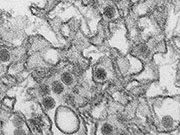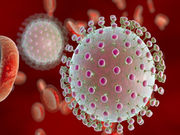Tag: Zika
Functional Limitations Ongoing With Congenital Zika
All 19 children reported one of six adverse outcomes; 12 had three to five outcomes at 19 to 24 months
CDC Updates Zika Guidance for Infant Care
Recommendations include evaluation and management of infants with possible infection
First Test to Detect Zika in Blood Donations Approved
Not designed to diagnose the infection, however
Single Mutation Made Zika Virus More Virulent
This viral polyprotein mutation increases microcephaly, mortality in mouse models
Immunochromatography Testing Differentiates Dengue, Zika
Serum ZIKV NS1 protein concentrations are 10-fold lower than corresponding DENV NS1 concentrations
Ocular Histopathology Features Seen With Congenital Zika
Features include loss of retinal pigment epithelium, presence of a thin choroid
Zika Virus Preferentially Targets Glioblastoma Stem Cells
ZIKV preferentially infects, kills GSCs relative to differentiated tumor progeny, normal neuronal cells
Zika, Cobalamin C Deficiency Tied to Similar Retinal Problems
Congenital Zika syndrome associated with severe ganglion cell layer loss, thinning of central retina
Zika Thrives in Pregnancy Due to Vulnerable Immune System
Study demonstrates effects of infection with different lineages of Zika virus on monocytes
Zika Does Not Appear to Last in Semen As Long As Thought
More research is needed to better inform public health recommendations














